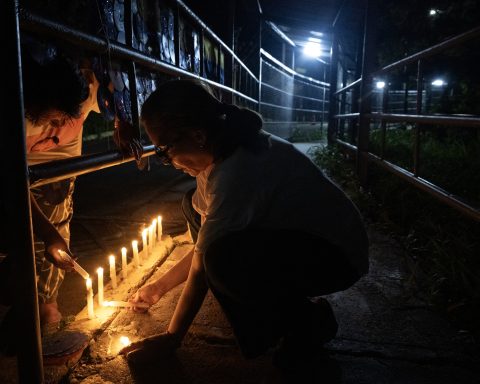By JOSE LUIS MORANTE
The Arcania collection promoted by the poet and editor María Gabriela Lovera Montero, in the digital catalog of Petalurgia.com, hosts derailed, a large baggage of aphorisms by Gabriela Rosas (Caracas, 1976). The Venezuelan carries out a plural task in which poetry —the true guiding thread of her aesthetics—, the short story, the editorial task and teaching in creative workshops are complementary facets. Throughout its journey, the publication horizon integrates deliveries the move (1999), endless august (2008). soft (2013), Anthology of Postmodern Short Stories (2014), Losses (2015), and With Truman and without you (2021). His poetic work, partially translated into English, Italian and other languages, is widely represented in magazines and anthologies and has won awards such as the First National Prize for Poetry for Young People Juan Antonio Pérez Bonalde (1995) and the First Prize at the National Biennial of Literature Lydda Franco Farías (2014).
For the first time, in a monographic way, Gabriela Rosas adds minimalism and the laconic will of the aphorism to her journey. From expressive synthesis, digital delivery dawns derailed, whose title, according to the poet and editor María Gabriela Lovera, proclaims an expressive gesture of rebellion. Rosas’s work is integrated into a collective editorial project personifying the El Carro card, the seventh card of the Tarot. In the twenty-two images that make up the deck, the chosen one represents the control of the mind over the passions. Thus, being “derailed” takes on a full meaning; that is, not following the traces of the road and advancing outside, on the periphery of what is established, breaking the rules of daily life. Two minimal incisions selected from the textual contribution of Eugenio Montejo — “Ama que se va el día” — and José Luis Morante — “With letters of rain she wrote another dream” — serve as a threshold to the book. The two are integrated in the wake of lyrical aphorism, cultivated by referential writers such as Juan Ramón Jiménez or Rafael Cadenas.
The short words of Gabriela Rosas confirm a fertile existential vein that emanates directly from her poetic world. It should be remembered that the writer cultivates a humanist intimacy, a clear mirror of the inner self, in which basic obsessions such as love and heartbreak can be glimpsed, a passionate territory always convulsed by desire and the dark flight of loss, the disintegration in the time or the anxiety of finding meaning in one’s own existence. The laconic strands encourage a reflective journey where experiential states resonate strongly: “To love you I started in the fire”, “Being the poem or the lightning, the same intensity, the same burn”, “Each one with their right to the fire ”, “To say love, first I say body”, “May your mouth be the place where we meet”, “It rains and it is with you”, “Thinking about the flame consumed me”. They are texts that distance themselves from a distant and objective contemplation of affective movement and are nourished by a close activism that hardly finds calm.
The word is also a body that is reborn at each dawn with muscles and bones, hugs and warmth. The questions of the poetic task reveal, as if they were traveling through the groping darkness of an interior space, dilated enigmas. They open windows of understanding, link the legacy of the biographical experience and the traces of scriptural work: “Poetry makes us better lovers”, “I write so that the body is a poem”, “Without pain there is no pleasure”, “Poetry is Like love, it happens to you or it doesn’t. The character defined in the texts of Gabriela Rosas maintains a commitment to lucidity; she posits in her gaze an insufficient reality, far removed from the summer tremor and the celebratory warmth of bodies in the sun. Who speaks is a vulnerable incision of nostalgia. From the evocation, the absence finds meaning and permanence.
The semantic perfection of some aphorisms, full of beauty, stands out in this lightness: “Helplessness is not having someone to undress you”; or the excellent paradoxical reflection: “I will be standing up every time you forget me”.
The plot path of derailed It leaves us in our hands an attitude on guard, where the withdrawal in the interior labyrinths is the clear path for memory. The vital experience is eroded by the passing of time, it has lost certainties to become exhausted in the mirages of being devoid of ideals. It is time to negotiate coherence and make room for the sensations that testify to defeat.
In that weather, family presences become a refuge where what has been lived germinates; This is how the breeze of return is born, the need to convert the therapeutic force of the aphorism into a permanent heritage. Memories become voice against being alone. With stripped diction, in the fragmentary look of derailed, Gabriela Rosas harmonizes thought and existential lyricism. In darts coexist the calm voice of the colloquial and a perception that keeps the mystery of the intensity and fruitful scoring of the imaginative. The voice expands ribs with emotional sincerity, with that open-eyed austerity that writes a denouement for hope.
ten aphorisms
No flower obeys its silence.
**
It’s not that they read you, it’s that they reread you.
**
Helplessness is not having someone to undress you.
**
Each with their right to fire.
**
May your mouth serve me as a prayer.
**
Let the journey be your body.
**
The sea spills over me.
**
It rains and it’s with you.
**
This being us is exhausting.
**
Words are not picked up.


















